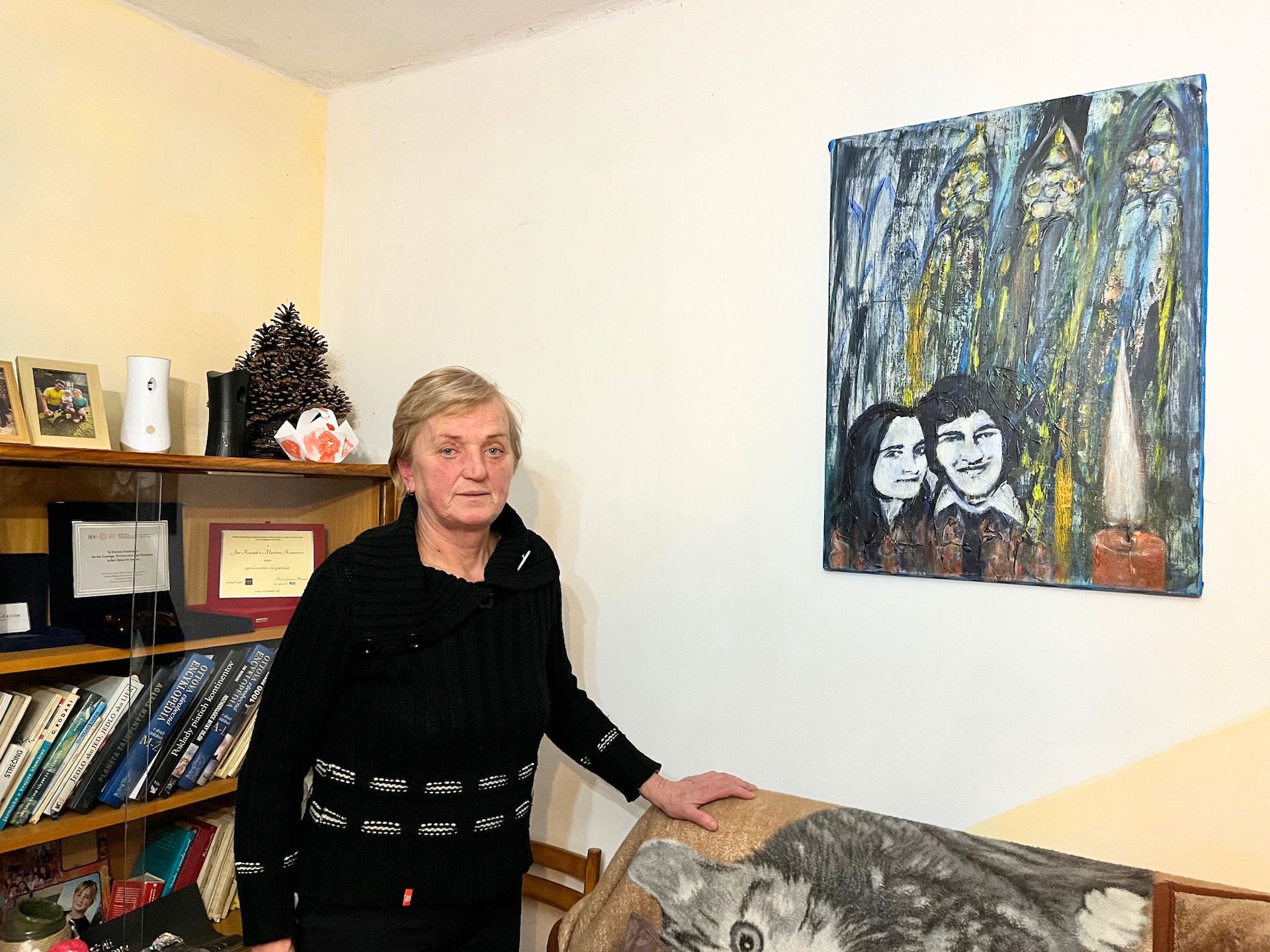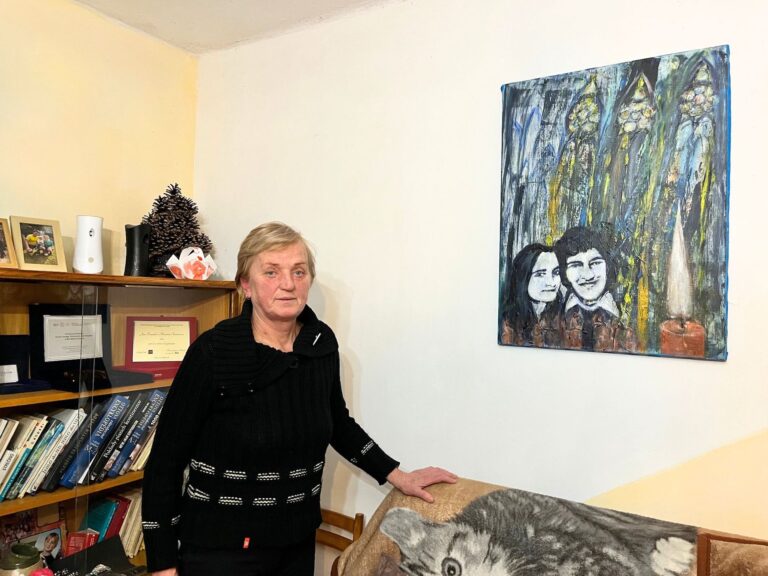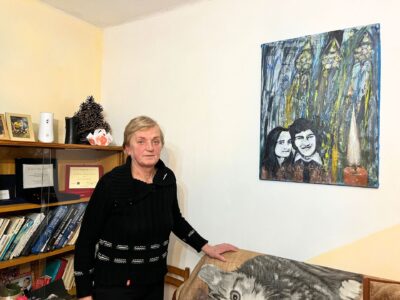Five years ago, on 21 February 2018, a murderer entered a house in Veľká Macha with the aim of killing investigative journalist Ján Kuciak. He knew that his fiancée, Martina Kušnírová, was also in the house. She also became a victim. However, the conviction of the shooter himself, at least according to the court, ended her case and she was excluded from further proceedings against those who ordered the murder. Zlatica, mother of the murdered Martina Kušnírová, also talks about how she thinks her daughter would perceive the movements in Slovak politics and society.
The original, Slovak version of this interview was published on icjk.sk
Mrs. Kušnírová, five years have passed since Martina’s and Ján’s murders. What were those five years like for you?
It’s hard to find the right words. The worst [years] of my life.
You lost your daughter and her fiancé. There are no words that can describe the feelings of a parent and that time. But still, you never avoided media interviews, you still travel to Pezinok for the hearings. How are you managing?
Sometimes not at all, but when I think about them lying in their own blood and what happened to them, why that happened to them, it gives me a spark. They can’t do anything, and we parents are here to finish it off for them. Parents should always be there for their children, whether they are alive or not. It’s our responsibility.
After they murdered Martina and Ján people took to the streets, and there was talk of a cleansing. In recent years, though, the legacy of Ján and Martina has been drowned out by the pandemic and last year by the war in Ukraine. How do you see it? How has society changed in the past five years? Has there been a shift?
At first, I also hoped that things would be alright. Finally, things would be set straight so that they didn’t die in vain, but since you mentioned these events, I think that this has messed people up. When I look at social media and how people behave overall… things are somehow bad with us, with society as a whole. Hatred, envy, animosity, no empathy whatsoever. Hoaxes, or whatever they call them. People fall for them. I have read some comments about why people mention Kuciak and Kušnírová so much when Lučanský has died, too [Milan Lučanský was president of the Police Force after his predecessor resigned because of the murder of Jan and Martina. He resigned from his post at the end of August 2020. A few months later he was arrested on suspicion of corruption. He committed suicide in detention at the end of 2020. Several conspiracy theories have been circulated in connection with his death that the government had him killed to silence him – editor’s note]. That can really get me angry, but recently, I’ve stopped responding. I read it [such comments], swear to myself, and leave it be, because it is pointless to explain it to people. I know Martina and Janko had a different opinion, that it’s necessary to explain things to people over and over, that they’ll eventually understand, but I’m afraid that people in Slovakia will never understand anything. Blurry eyes, blurred vision, hearing. They’ll fall for any rumor and for promises that will never be kept.
After the murders, there seemed to be a united front in society, for example, about attacks on journalists, but now…
Now, it’s fading somehow. I don’t know what’s wrong with people. Things are very bad.
How do you think Martina would see it? The changes in society, that even though we had Mečiarism here and a pretty bad period in Slovak politics, now we are witnessing growing populism in politics and radicals doing well in the polls. How would she see this?
She’d certainly find a way to fight against it. Because I remember when Mečiar ruled. She was in elementary school. [My] Mom and of course all the old ladies adored him. She came out of church, everyone was talking. She turned it [the television] on and as a small child she had a sense of responsibility, or you could say, a sense for politics, because she came and shut it off. Mom would say to her “you can’t do that,” and she answered “Granny, I’ll give you 20 crowns for electricity, and you won’t watch that.” So, I think that now what she could have done she would have done in her own way with Janko. Janko would write. She was always his first reader, and she guided him, in that human way of hers. On the other hand, she, too, was educated, was very intelligent, she always knew how to present herself. She certainly would have found a way, at least, as she would say, “Mom, let’s at least talk to the people around us; they’ll talk to others, and it’ll go from there.” I know that it won’t be today, tomorrow, but people will eventually understand. But unfortunately, people in Slovakia don’t want to understand.
After the murders, we saw, and certainly you noticed, too, that at first people expressed sympathy, empathy, solidarity. You also talk about the changes that have occurred in society. But even then at the beginning, there were some heartless people, and you became the target of attacks. What does it look like now? Are there still positive shows [of support] or have there been more negative ones over the years?
I’d say half and half, but for example, recently, some woman came at me, now as the [fifth] anniversary is approaching and there’s the [documentary] film [about the murder of Ján and Martina], and they put me in it. She began swearing about me, about why are they showing that alcoholic, that drunk, and that they should stop with her and with the Kuciaks. I didn’t react; people got in her face. So, I’d say it’s half and half. There are good people who are perhaps silent or don’t react, but they know how to write or react in their own way to stand up for someone.
Have you ever encountered any direct personal attacks? Because we all know that on social media people write all kinds of things in comments.
Not to my face. They wouldn’t dare. To tell you the truth, often I’d like to talk to those who swear on social media face to face. To see if they’d be such big heroes face to face. Most, I think, are people, I don’t know if I’d say bad people, but people who have problems with themselves, with their lives. Because . . ., despite what happened to me, if I don’t know how to help, I won’t react badly. If I don’t know how to offer support, or at least give a kind word to support that person, I’d rather not write anything. And I certainly won’t start hurting people. It’s about those people, that they have a problem, not me. They are the ones with the problem. Sometimes, I actually feel sorry for them. I’ve already learned to live with it, because you know at the beginning I started to get letters, all kinds of negative ones, but I just said enough, stop, this isn’t about me, but about them. It’s a presentation of themselves, their lives. They’re fumbling through life; they need professional help, and they turn [their anger] on others.
It has been five years already, but as of yet not everyone that the investigators have identified as perpetrators have been convicted. How do you view the ongoing trial?
The lawyers are reassuring us that it’s going in a good direction, but I’m afraid that it will end up the same way it did in September, because at the very least they’ve excluded me from the proceedings. Alright, I accept it. The attack was on Janko not Martinka. But everyone knew who Janko lived with. And now this is proving to be the case. I see it as a mother. It touched me deeply because now there is this evidence from Kočner that he checked up on Martina. But no one does anything. My lawyer went with this argument, but it is supposedly the end of the trial. . . . As a mother, it makes me a bit sad that people don’t really talk about how in the court and overall she is being brushed aside. I don’t have anything against the Kuciaks or Janko, for being Janko and her. But she deserves justice even more because she never wrote a single word. I’m not saying that Janko is guilty. God forbid, never. Many people told me that now the Kuciaks were there over the weekend and why am I in contact with them, why do we go to the hearings together. . . why am I not angry with them or Janko. That thought never occurred to me because I knew Janko. I was looking forward to having such a clever, proper son-in-law. That would never occur to me. But it makes me a bit sad to think that if she was far away… but they died there together. That’s how I see it as a mother.
If I recall correctly, when they excluded you from the retrial, the judge said that you should bring forth a civil case. Have you taken any steps in this direction?
I spoke with [my] lawyer and he told me that now we have to focus all our energy on what is happening now, on the court proceedings. I think that in the future he won’t be able to manage any more since he’s not working for money. I must commend him for not taking as much as a single euro from me [and for] helping however he can. He deserves credit, but I don’t know if he is going to get involved with that. I was sorry at the time because the vote [ of the court senate, on the basis of which she was excluded from the trial – editor’s note] was two to one. I know how everyone voted but I won’t say it publicly here. It was what it was. Fine, but now that they have merged it, they should have left it as Jan Kuciak, Martina Kušnírová, and the prosecutors. It felt to me like it was brushed aside. Janko was the only one left. The evidence was against Janko, but it’s hard for me to say anything about that. I am sorry about it.
How do you view the perpetrators of the murder because some of them, for example, Zoltán Andruskó, if I’m not mistaken, and Miroslav Marček apologized in court. Have they tried to contact you?
I think that Marček and Andruskó wrote us through JOJ [television station]. They both wrote. They apologized. I might have accepted their apology if it would have been an accident, that they didn’t want to cause harm, that it just happened. I’d have to cope with that. But this was intentional. They were tempted by money and did it for money. And even though they are guilty and have been punished for it, I think that most of the guilt is on the one who ordered the murder. The one who paid for it. They weren’t interested in taking out Janko and Martinka. They had no interest in that at all. If no one had sent them there, no one had given them information from surveilling them and no one had paid them, they’d have no interest in going there to murder. My anger is more directed at those who ordered it, those who are still sitting there as defendants and not convicts.
Given what you went through during the first trial, then when the Supreme Court sent the case to retrial, and now during the second trial, considering that you’ve been excluded from it, do you still believe in justice in Slovakia?
No. I’m afraid that everything here is manipulated, if not outright bought then at least under pressure. Now you see that they convict someone and then two or three days later they release them. They use paragraph 363. Today everyone does what they want. This is a country where no one has the character to know that you can’t do something, that something shouldn’t be done. That’s not within my competence; it’s against my moral, ethical, or professional principles. The people in those positions should do it with that human aspect in mind. Then they should take into account professional issues. I think that if that human aspect was taken into account in our case, in the case of Martinka, then that verdict that ended with Kočner’s release would have taken another direction. Sure, the court examined [the evidence] because there was evidence, but they didn’t want to see, they didn’t want to put that puzzle together. That’s why I say I don’t believe in justice. Simply, if it’s not bought, then it’s done under pressure.
Is there still hope that it will change? Society or politics in Slovakia?
There is hope here, but it will take a long time yet. It will take a long time. When Janko said that since he was writing and wanted changes for Slovakia, he would make changes, I said, “Why are you doing this? You know they won’t accept or believe it.” But he said one day people will believe it, “I will write and people will believe.” Martinka told me to talk to the people around me, “when we talk to them, they’ll talk to others; society will wake up.” But unfortunately, that’s not happening. They died for that filth, and no one cares, whether they are politicians or public officials. I mean judges, prosecutors. There are exceptions, but they are rare.
 Support independent investigative journalism in Slovakia,
Support independent investigative journalism in Slovakia,
you can donate here.
Karin Kőváry Sólymos is a Slovak journalist at the Investigative Center of Ján Kuciak. Previously, she was an editor and presenter at the Hungarian channel of the Slovak public service media. During her university years, she was an analyst for the only fact-checking portal in Slovakia. She was a recipient of the Novinarska Cena 2022.







